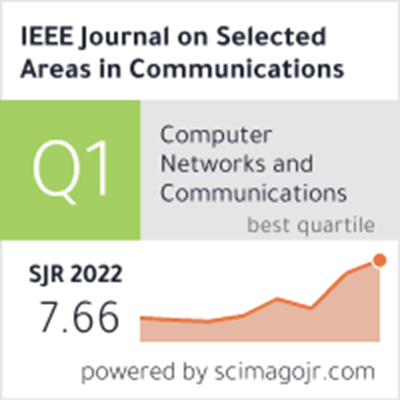当无线网络中的社交网络效应遇到拥塞效应时:数据使用均衡与最优定价
IF 13.8
1区 计算机科学
Q1 ENGINEERING, ELECTRICAL & ELECTRONIC
IEEE Journal on Selected Areas in Communications
Pub Date : 2017-02-01
DOI:10.1109/JSAC.2017.2659059
引用次数: 81
摘要
在线社交网络的快速增长加强了无线用户的社交关系,而社交领域的网络效应又带来了更多的数据流量。然而,对无线服务的需求增加可能会挑战有限的无线容量。为了建立一个全面的理解,我们通过共同考虑移动用户在社交领域的社交关系引起的网络效应和物理无线领域的拥塞效应来研究移动用户的数据使用行为。具体来说,我们开发了一个具有社会意识的数据使用的Stackelberg游戏:在第一阶段,无线提供商首先决定向所有用户的数据定价,以最大限度地提高其收入,然后在第二阶段,用户在社交网络效应和拥塞效应下的相互作用下,以给定的价格决定他们的数据使用。我们通过后向归纳法来分析两阶段博弈。特别是,对于第二阶段,我们首先提供了用户需求均衡(UDE)存在和唯一性的条件。然后,我们提出了算法来找到UDE,并让用户以分布式方式到达UDE。我们进一步研究了不同系统参数对UDE的影响。接下来,对于第一阶段,我们开发了一种最优定价算法,以最大限度地提高无线提供商的收入。我们使用真实数据对我们提出的算法的性能进行了数值评估,从而为无线提供商的运营提供了有用的工程见解:1)当社交网络效应主导拥塞效应时,总使用量的边际收益随着社交关系和用户数目的增加而增加,或者随着拥塞系数的降低而减少;相反,当拥塞效应主导社会网络效应时,边际收益随着这些参数的增加而减少(或分别增加);2)当社会网络效应较强时,应设定较低的价格来增加总收入;相比之下,当拥堵效应较强时,更高的价格是优选的。本文章由计算机程序翻译,如有差异,请以英文原文为准。
When Social Network Effect Meets Congestion Effect in Wireless Networks: Data Usage Equilibrium and Optimal Pricing
The rapid growth of online social networks has strengthened wireless users’ social relationships, which in turn has resulted in more data traffic due to network effect in the social domain. Nevertheless, the boosted demand for wireless services may challenge the limited wireless capacity. To build a thorough understanding, we study mobile users’ data usage behavior by jointly considering the network effect due to their social relationships in the social domain and the congestion effect in the physical wireless domain. Specifically, we develop a Stackelberg game for socially aware data usage: in Stage I, a wireless provider first decides the data pricing to all users in order to maximize its revenue, and then in Stage II, users decide their data usage, for the given price, subject to mutual interactions under both social network effect and congestion effect. We analyze the two-stage game via backward induction. In particular, for Stage II, we first provide conditions for the existence and the uniqueness of a user demand equilibrium (UDE). Then, we propose algorithms to find the UDE and for users to reach the UDE in a distributed manner. We further investigate the impact of different system parameters on the UDE. Next, for Stage I, we develop an optimal pricing algorithm to maximize the wireless provider’s revenue. We numerically evaluate the performance of our proposed algorithms using real data, and thereby draw useful engineering insights for the operation of wireless providers: 1) when social network effect dominates congestion effect, the marginal gain of the total usage increases with the social ties and the number of users, or decreases with the congestion coefficient; in contrast, when congestion effect dominates social network effect, the marginal gain decreases (or increases, respectively) with these parameters and 2) when social network effect is strong, a lower price should be set to increase the total revenue; in contrast, when congestion effect is strong, a higher price is preferred.
求助全文
通过发布文献求助,成功后即可免费获取论文全文。
去求助
来源期刊
CiteScore
30.00
自引率
4.30%
发文量
234
审稿时长
6 months
期刊介绍:
The IEEE Journal on Selected Areas in Communications (JSAC) is a prestigious journal that covers various topics related to Computer Networks and Communications (Q1) as well as Electrical and Electronic Engineering (Q1). Each issue of JSAC is dedicated to a specific technical topic, providing readers with an up-to-date collection of papers in that area. The journal is highly regarded within the research community and serves as a valuable reference.
The topics covered by JSAC issues span the entire field of communications and networking, with recent issue themes including Network Coding for Wireless Communication Networks, Wireless and Pervasive Communications for Healthcare, Network Infrastructure Configuration, Broadband Access Networks: Architectures and Protocols, Body Area Networking: Technology and Applications, Underwater Wireless Communication Networks, Game Theory in Communication Systems, and Exploiting Limited Feedback in Tomorrow’s Communication Networks.

 求助内容:
求助内容: 应助结果提醒方式:
应助结果提醒方式:


